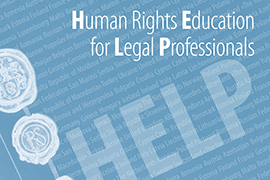Article
The freedom of expression of lawyers towards judges and experts
By a judgment of the Grand Chamber and a Chamber decision made during the first half 2015, the European Court of Human Rights (ECtHR) has developed its case law related to the freedom of expression of lawyers, guaranteed by article 10 of the European Convention on Human Rights (ECHR).
The cases related to two types of actors involved in judicial proceedings: permanent actors - the sitting judges - who are the natural contact points for lawyers and obstacle for lawyers; intermittent actors - the sworn experts - whose opinion may have an important influence on outcome of a trial.
****
In the case of Morice v. France (n° 29369/10), a French lawyer has been criminally and civilly punished for defamation due to criticism of two judges published in an article in a leading daily. This article repeated, on one hand, the terms of a letter addressed by Mr Morice to the Minister of Justice requesting an administrative investigation into the judges’ conduct, and on the other hand, comments made to the journalist author of the article in question. Mr Morice was sentenced with a fine and ordered to reimburse costs, pay damages and to publish statement in the daily in question.
By a judgment of 23 April 2015, adopted unanimously, the Court found a violation of article 10 of the Convention. It was stated in particular that Mr Morice had expressed himself through value judgments, which relied on a sufficient factual basis. His words dealt with a subject of general interest, namely the functioning of justice and the progress of a case which addressed a matter of wide importance and a high level of media coverage.
The significance of the judgment lies in the comprehensive consideration of the case law of the ECtHR related to the freedom of expression of lawyers, which is different depending on whether the lawyer expresses him/herself inside or outside the courtroom.
Its relevance also lies in the fact that, according to the Court, “in view of the specific status of lawyers and their position in the administration of justice … lawyers cannot be equated with journalists. Their respective positions and roles in judicial proceedings are intrinsically different. Journalists have the task of imparting, in conformity with their duties and responsibilities, information and ideas on all matters of public interest, including those relating to the administration of justice. Lawyers, for their part, are protagonists in the justice system, directly involved in its functioning and in the defence of a party.”
It also lies in the statement according to which “a lawyer should be able to draw the public’s attention to potential shortcomings in the justice system; the judiciary may benefit from constructive criticism.”
Finally, it lies in the distinction which can be made between judges, who are restricted by the particular mission of the judiciary in society, and lawyers: “the speech of judges, unlike that of lawyers, is received as the expression of an objective assessment which commits not only the person expressing himself, but also, through him, the entire justice system. Lawyers, for their part, merely speak in their own name and on behalf of their clients”.
Nevertheless, the Court emphasises that “the proper functioning of the courts would not be possible without relations based on consideration and mutual respect between the various protagonists in the justice system, at the forefront of which are judges and lawyers.”
****
In the case of Fuchs v. Allemagne (n° 29222/11 and 64345/11), a German lawyer had been disciplinarily and penally condemned for defamatory speech towards an expert in informatics, expressed in written observations given to a tribunal and relating to an indictment.
While he was representing a client accused of having downloaded child pornography on his computer, Mr Fuchs had argued that a private expert who was mandated by the Prosecutor’s Office to decrypt the data files, who was sworn in before taking up his duties before the judicial authorities, could have manipulated the files in order to obtain the evidence required by the Prosecutor’s Office. The expert filed a complaint for defamation, and Mr Fuchs was sentenced, in particular, to a fine.
Subsequently, the disciplinary commission of lawyers reprimanded Mr Fuchs and imposed a fine for having failed to meet his obligation to conduct his professional activities in a conscientious manner and to deserve the trust associated to this profession.
By a decision of 27 January 2015, adopted unanimously, the Court declared the application was manifestly ill-founded and therefore inadmissible. The sanctions imposed on Mr Fuchs constituted an interference with his right to freedom of expression, but they were provided for by law (the penal code and the code of legal professions), they pursued a legitimate goal (protection of reputation and protection of the rights of the sworn in expert), and they were necessary in a democratic society.
The Court assessed that Mr Fuchs could not, in the name of defence of his client’s interests, generally suggest that the expert falsified the evidence. Moreover, the comments at issue did not include any objective criticism of the expert’s work on the trial, though they were aimed at generally denigrating his work and declaring his conclusions unworkable. Thus they were not justified by the legitimate defence of the client’s interests. Furthermore, they were not made in public. Finally, the Court does not judge the fines imposed in the framework of criminal and disciplinary procedures to be disproportionate.
It is the first case where the Court has ruled on a challenge by a lawyer on the integrity of a sworn in expert. According to the Court, sworn in experts “must be able to perform their duties in conditions free of undue perturbation if they are to be successful in performing their tasks. It may therefore be necessary to protect them from offensive and abusive verbal attacks when on duty”.
It is an important decision. Firstly, because the use of sworn in experts is relatively frequent in European countries, particularly in criminal matters. Secondly, and more importantly, because the Court does not forbid lawyers to criticise the experts’ work at any point, although it sets some reasonable limits in this regard.
****
Ultimately, the Morice judgment and the Fuchs decision result from very different circumstances and come to a close in a very different way: a violation in one case and a finding of inadmissibility in the other. They concern, however, the same issue, that of lawyers’ freedom of expression. They present also the same merit of specifying lawyers’ rights and duties when they comment on judges and sworn in experts. To that extent, they are useful to a profession which is often at the forefront, in Europe, of the enforcement of the Convention.
Vincent BERGER
Avocat au barreau de Paris
Professeur au Collège d’Europe
Ancien jurisconsulte de la Cour européenne des droits de l’homme
Milli səhifələrə çıxış




